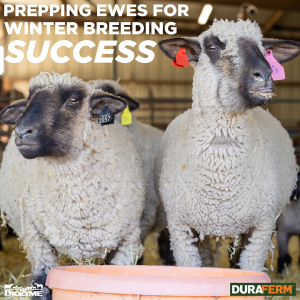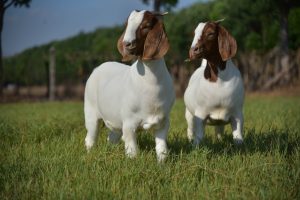
Goats come in all shapes and sizes. But how do they get to be all those different sizes? Goats require nutrients to grow, and as a goat owner, you want to give them the best nutrition possible. But what do goats eat?
It’s been said that goats will eat everything and anything you put in front of them; however, that just is not true. Nor should you try to feed them everything possible.
Goats require energy, protein, vitamins, minerals, fiber, and water to thrive and perform. Let’s explore each of these nutrients, why they are important to their diets, and how they each benefit the goat.
DuraFerm® Can Help
DuraFerm® is a renowned brand of nutritional supplements nutritional supplements for sheep and goats that supports optimal digestion and nutrition for maximized performance at every stage of production. Our products support producers looking to maximize their operations. Best of all, DuraFerm products support reproduction using organic trace minerals.
The DuraFerm brand is developed by BioZyme® Inc., a leading fermentation company pioneering advancements in animal nutrition and health. Through innovative research and high-quality manufacturing, BioZyme creates powerful solutions that improve animal performance and support producer profitability in the agricultural industry.
Our mission: undeniable positive impact on the health and wellness of your animals and your business.
So, What do Goats Eat?
Goats need the same basic nutrients as most living beings: protein, energy, fiber, vitamins, minerals, and water. Let’s examine the key ingredients in a goat’s diet more closely to better understand how to care for them.
So, what do goats eat?
Water
In this case, it’s a matter of what do goats drink. Water is the most essential nutrient for every living being. Many biological functions, including growth, development, and reproduction, depend on adequate water in the goat diet. While water needs vary depending on the production phase your herd is in, one thing remains constant. Goats need a constant source of fresh, clean water.
Typically, a 110-pound goat will drink 1 to 3 gallons of water per day, depending upon diet, intake, and weather. A lactating doe requires an additional 1 quart of water for every 1 pint of milk she produces. If a goat is producing 5 pints of milk at peak lactation while raising twins, 2.5 gallons of water are necessary each day
Forage & Fiber
Goats and sheep are ruminants, just like cattle. Ruminants have four-compartment stomachs that, unlike many animals, can digest roughage like grass, hay, and silage. Forage adds bulk to the diet and keeps the rumen functioning properly by increasing rumination and salivation.
Most nutritionists agree that goats and sheep should always have roughage in their diets, at least one pound per head per day. Goats are very active foragers that exhibit a high degree of selectivity. They are able to cover a wide area in search of scarce plant materials.
Their small mouths and split upper lips enable them to pick small leaves, flowers, fruits, and other plant parts, choosing only the most nutritious available feed.
If you want to improve the results of your goats grazing, here’s what some studies show about goat grazing habits:
- Select grass over clover.
- Prefer browse over grazing.
- Prefer foraging on rough and steep land over flat, smooth land.
- Graze along fence lines before grazing the center of a pasture.
- Graze the top of the pasture canopy fairly uniformly before grazing close to the soil level.
Protein Sources
Forage
- Legumes: Alfalfa, clover and other legume hays are rich in protein. Alfalfa hay, in particular, is a high-protein forage commonly fed to goats.
- Pasture: Fresh pasture grasses, especially those mixed with legumes, provide a useful source of protein.
Grains & Concentrates
- Commercial Goat Feed: Specially formulated feeds often contain balanced protein levels tailored for goats.
- Soybean Meal: This is a common protein supplement in goat feeds due to its high protein content.
- Cottonseed Meal: Another high-protein supplement that can you can include in their diet.
By-products
- Brewers’ Grains: These are a by-product of the brewing industry and can be a high-protein supplement for goats.
- Distillers’ Grains: Similar to brewers’ grains, these are a by-product of the distilling industry and are also high in protein.
Importance of Protein
Protein is important for the growth and development of your herd. It is also an essential nutrient during lactation to produce milk and is vital for the reproductive health of both your does and bucks.
- Growth and Development:
- Protein is essential for the growth of muscles and other tissues. Kids (young goats) require higher protein levels to support rapid growth and development.
- Protein is also necessary for the development and repair of body tissues in adult goats.
- Milk Production:
- Lactating does need high levels of protein to make milk. Milk production places significant demands on the goat’s body, and sufficient protein intake ensures the maintenance of good milk yield and quality.
- Reproductive Health:
- Adequate protein intake is crucial for the reproductive health of breeding goats. It supports the development of healthy offspring and the overall reproductive cycle.
- Immune Function:
- Proteins are vital for the production of antibodies and other components of the immune system. A diet rich in protein helps goats maintain a robust immune system to fight off infections and diseases.
Energy Sources
Forage
- Grasses: Fresh pasture grasses provide useful sources of energy through carbohydrates.
- Hay: Good-quality grass hay is a significant energy source, especially in the winter when fresh pasture is unavailable.
Grains & Concentrates
- Corn: A high-energy grain that is commonly fed to goats.
- Oats: Another energy-rich grain that is easily digestible.
- Barley: Is also a good source of energy, though it is slightly less digestible than corn.
By-products:
- Molasses: Often added to commercial feeds, molasses provides a quick energy source and makes the feed more palatable.
- Beet Pulp: A by-product of sugar beet processing, it is high in energy and fiber, and it can be fed dry or soaked.
Importance of Energy
Goats need energy for daily activities like walking and grazing. It triggers the metabolic process needed for life. In collaboration with protein, energy is vital for growth, lactation, and reproductive health.
- Daily Activities & Metabolism:
- Goats need energy for all their daily activities, including walking, grazing and other bodily functions. Energy fuels the metabolic processes necessary for life.
- Growth:
- Energy, in combination with protein, is crucial for growth. Young goats need ample energy to support their rapid growth and development.
- Milk Production:
- Like protein, energy is essential for milk production in lactating does. High energy levels ensure that goats have enough reserves to produce milk efficiently.
- Reproductive Health:
- Energy is also vital for reproductive health. Goats need sufficient energy to maintain their body condition and support the energy-intensive processes of gestation and lactation.
- Body Condition & Health:
- Adequate energy intake is necessary to maintain a healthy body condition. Goats that receive enough energy are less likely to suffer from weight loss, poor coat condition and other health issues.
Vitamins & Minerals
To provide your herd with a balanced diet, round out your nutritional program with a complete vitamin and mineral package like that offered by DuraFerm.
DuraFerm is a line of nutritional supplements for sheep and goats that supports optimal digestion and nutrition for maximized performance at every stage of production.
With two different formulas made specifically for goats, DuraFerm mineral is ideal for any operation’s management goals.
DuraFerm® Goat Concept•Aid®
Are you looking for a loose mineral that is best for your herd’s year-round nutrition needs? DuraFerm Goat Concept•Aid is a free-choice vitamin and mineral supplement for goats designed to support reproductive success.
It contains AO-Biotics® Amaferm®, a prebiotic research-proven to enhance digestibility and high levels of vitamin E for reproductive tract repair. Additionally, it supports embryo production and conception using organic trace minerals.
DuraFerm® Goat Concept•Aid® Protein Tub
Another quality product that might even be more ideal for setting up does for flushing is the DuraFerm Goat Concept•Aid Protein Tub. This protein tub with vitamins and minerals for goats is designed to support reproductive success.
The 50-pound tub contains the Concept•Aid goat mineral package in a 20% natural protein tub. It supports embryo production and conception using organic trace minerals and elevated levels of vitamin E. Like all DuraFerm products, it contains Amaferm to enhance digestibility.
“DuraFerm is formulated at 2.5 times the NRC requirements to ensure that your herd is getting the best nutritional supplement possible. Add that in with the Amaferm, Vitamin E and organic trace minerals, you are sure to have some of the healthiest, most reproductively sound females,” said Sam Silvers, Director of National Specialty Livestock.
Every DuraFerm product is powered by AO-Biotics® Amaferm®, a prebiotic research proven to enhance digestibility. We know that 70% of the immune response is found in the digestive system. Keeping those small ruminants healthy in their digestive tract will help improve their overall health as well.
What do Goats Eat? DuraFerm!
Hopefully you have answered the question you originally asked, what do goats eat? And now you know in addition to protein, energy, water and forages, your goats need a quality vitamin and mineral program like DuraFerm. Adding DuraFerm to your operation is easy.
Find a dealer closest to you by using our dealer locator.
Perhaps you want to buy it online. You certainly can!
Want more information about DuraFerm or to use our goat gestation calculators? Visit us online.

